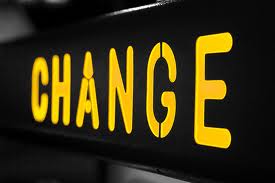Change is Always Too Late - 'Tribes' Review pt. 3
"Change almost never fails because it's too early, it almost always fails because its too late."
I'd never thought about that until I read that quote. Change is often a reactionary measure, not a preemptive one.
I can't help but think of this in sports terms. Great defenders dictate the flow of the game, they do not react to the other teams offense. The Baltimore Ravens don't react to the other team, the other team reacts to the Baltimore Ravens defense. They dictate the game. They change their look and schemes, as a preemptive measure, to confuse the offense and make them show their hand.
Mediocre defenders are always reacting to what the other person/team is doing. Their change is too late.
I also can't help but think of this in terms of ministry. In a world of ever changing fads, trends, technologies, and talking heads, how do we know when and what to change?
This is a question that has certainly caused debate amongst people in ministry for years. Part of the issue is 'being in the world but not of it', but the other part is the stigma of bucking tradition. I'm a huge believer that 'doing something because that's how it's always been done' is a terrible reason for doing anything. As if 'the way we've always done it' is infallible and timeless.
As for the 'being in the world but not of it' part...that's the tricky one, at least in my book. This is where change and bucking tradition can be abused, all in the name of 'progress'.
When MTV, E News, and TMZ become your go-to's for sermon illustration ideas, in my mind you've crossed the 'in the world but not of it' line.
But I digress, back to the original question: how do we know when and what to change?
In the 'what' category you need to put 'everything'. There should be no sacred cows in your ministry. Everything is up for change. The 'when' category is the real trick, as the quote at the beginning of this post alluded too. We cannot afford to wait for something to break before we realize it needs to be changed. Much like car maintenance we need to do routine check ups on our ministries. Routine means on a regular schedule. So, practically speaking, this means when you meet with your volunteers you are discussing what can be changed and how. One of the questions I always ask my volunteer staff is 'what can we do better?' in other words 'what can we change, so we can minister the Gospel more effectively to our students?'
We cannot be afraid of change. We can't get stuck using flannelgraph because that's what worked when we were kids. We also cannot compare our ministries to other ministries. Every single ministry is unique and unique means different. Different, just like change, is an OK thing. If we're too busy trying to keep up with the huge church down the road we'll miss out on our real purpose, to lead teenagers towards a relationship with God. You can do that with a huge budget or a small budget, it doesn't matter. But you cannot do that if you're afraid of change things up.
Do not be afraid of change. pursue it. make it. cause it.
What does not being afraid of change look like in your ministry?
[part 3 in a series on 'Tribes' by Seth Godin]
